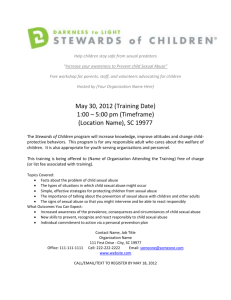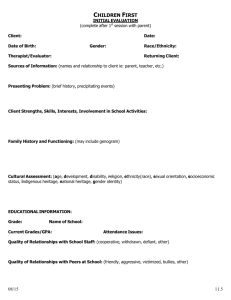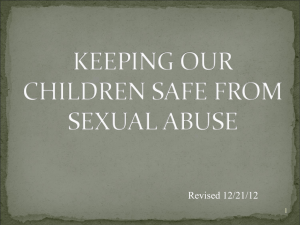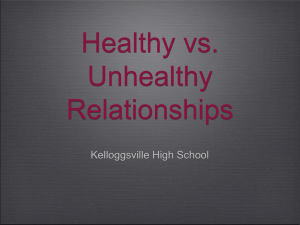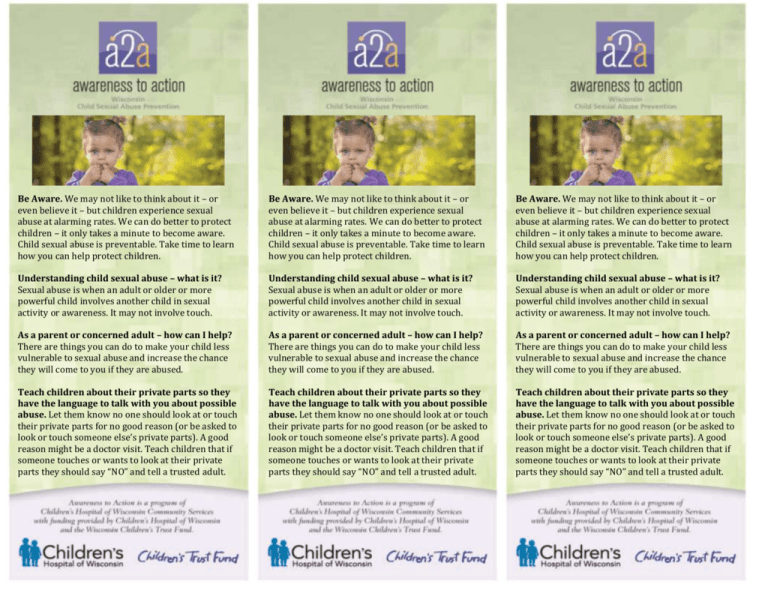
Be Aware. We may not like to think about it – or
even believe it – but children experience sexual
abuse at alarming rates. We can do better to protect
children – it only takes a minute to become aware.
Child sexual abuse is preventable. Take time to learn
how you can help protect children.
Be Aware. We may not like to think about it – or
even believe it – but children experience sexual
abuse at alarming rates. We can do better to protect
children – it only takes a minute to become aware.
Child sexual abuse is preventable. Take time to learn
how you can help protect children.
Be Aware. We may not like to think about it – or
even believe it – but children experience sexual
abuse at alarming rates. We can do better to protect
children – it only takes a minute to become aware.
Child sexual abuse is preventable. Take time to learn
how you can help protect children.
Understanding child sexual abuse – what is it?
Sexual abuse is when an adult or older or more
powerful child involves another child in sexual
activity or awareness. It may not involve touch.
Understanding child sexual abuse – what is it?
Sexual abuse is when an adult or older or more
powerful child involves another child in sexual
activity or awareness. It may not involve touch.
Understanding child sexual abuse – what is it?
Sexual abuse is when an adult or older or more
powerful child involves another child in sexual
activity or awareness. It may not involve touch.
As a parent or concerned adult – how can I help?
There are things you can do to make your child less
vulnerable to sexual abuse and increase the chance
they will come to you if they are abused.
As a parent or concerned adult – how can I help?
There are things you can do to make your child less
vulnerable to sexual abuse and increase the chance
they will come to you if they are abused.
As a parent or concerned adult – how can I help?
There are things you can do to make your child less
vulnerable to sexual abuse and increase the chance
they will come to you if they are abused.
Teach children about their private parts so they
have the language to talk with you about possible
abuse. Let them know no one should look at or touch
their private parts for no good reason (or be asked to
look or touch someone else’s private parts). A good
reason might be a doctor visit. Teach children that if
someone touches or wants to look at their private
parts they should say “NO” and tell a trusted adult.
Teach children about their private parts so they
have the language to talk with you about possible
abuse. Let them know no one should look at or touch
their private parts for no good reason (or be asked to
look or touch someone else’s private parts). A good
reason might be a doctor visit. Teach children that if
someone touches or wants to look at their private
parts they should say “NO” and tell a trusted adult.
Teach children about their private parts so they
have the language to talk with you about possible
abuse. Let them know no one should look at or touch
their private parts for no good reason (or be asked to
look or touch someone else’s private parts). A good
reason might be a doctor visit. Teach children that if
someone touches or wants to look at their private
parts they should say “NO” and tell a trusted adult.
Tell children it’s okay to say “NO” to touch that
makes them scared or uncomfortable. Tell them
their “NO” will be respected by you whether it is play,
tickling or hugging.
Tell children it’s okay to say “NO” to touch that
makes them scared or uncomfortable. Tell them
their “NO” will be respected by you whether it is play,
tickling or hugging.
Tell children it’s okay to say “NO” to touch that
makes them scared or uncomfortable. Tell them
their “NO” will be respected by you whether it is play,
tickling or hugging.
Talk to your child about the difference between a
secret and a surprise. A surprise is something nice
like a party or gift. Secrets are things someone asks
you to keep hidden from your parents or that break
family rules.
Talk to your child about the difference between a
secret and a surprise. A surprise is something nice
like a party or gift. Secrets are things someone asks
you to keep hidden from your parents or that break
family rules.
Talk to your child about the difference between a
secret and a surprise. A surprise is something nice
like a party or gift. Secrets are things someone asks
you to keep hidden from your parents or that break
family rules.
Find ways to incorporate “what ifs” into everyday
situations. This lets your child practice newly learned
skills. Create ways to open communication about
relevant topics and listen to their thoughts.
Find ways to incorporate “what ifs” into everyday
situations. This lets your child practice newly learned
skills. Create ways to open communication about
relevant topics and listen to their thoughts.
Find ways to incorporate “what ifs” into everyday
situations. This lets your child practice newly learned
skills. Create ways to open communication about
relevant topics and listen to their thoughts.
Show kids they can share things that may be
shameful to them. Children who are abused often
believe it was their fault because the offender has told
them so. How do you respond when your child tells
you they lost their lunch money or got in trouble?
Supporting your child even when they’ve done wrong
creates trust and makes them more likely to come to
you with bigger issues.
Show kids they can share things that may be
shameful to them. Children who are abused often
believe it was their fault because the offender has told
them so. How do you respond when your child tells
you they lost their lunch money or got in trouble?
Supporting your child even when they’ve done wrong
creates trust and makes them more likely to come to
you with bigger issues.
Show kids they can share things that may be
shameful to them. Children who are abused often
believe it was their fault because the offender has told
them so. How do you respond when your child tells
you they lost their lunch money or got in trouble?
Supporting your child even when they’ve done wrong
creates trust and makes them more likely to come to
you with bigger issues.
Who are the offenders? Offenders are male or
female, young or old, and from any economic/ethnic
group. Statistics say nearly 96% of offenders know
their victims and could include family members.
Who are the offenders? Offenders are male or
female, young or old, and from any economic/ethnic
group. Statistics say nearly 96% of offenders know
their victims and could include family members.
Who are the offenders? Offenders are male or
female, young or old, and from any economic/ethnic
group. Statistics say nearly 96% of offenders know
their victims and could include family members.
What if a child discloses to me? If a child discloses
abuse, they need someone to respond calmly and
without judgment, and to be believed and protected.
Tell them that telling was the right thing, and it wasn’t
their fault.
What if a child discloses to me? If a child discloses
abuse, they need someone to respond calmly and
without judgment, and to be believed and protected.
Tell them that telling was the right thing, and it wasn’t
their fault.
What if a child discloses to me? If a child discloses
abuse, they need someone to respond calmly and
without judgment, and to be believed and protected.
Tell them that telling was the right thing, and it wasn’t
their fault.
For more information, visit:
a2awisconsin.org.
For more information, visit:
a2awisconsin.org.
For more information, visit:
a2awisconsin.org.
©2013 Children’s Hospital of Wisconsin. All rights reserved.
©2013 Children’s Hospital of Wisconsin. All rights reserved.
©2013 Children’s Hospital of Wisconsin. All rights reserved.



